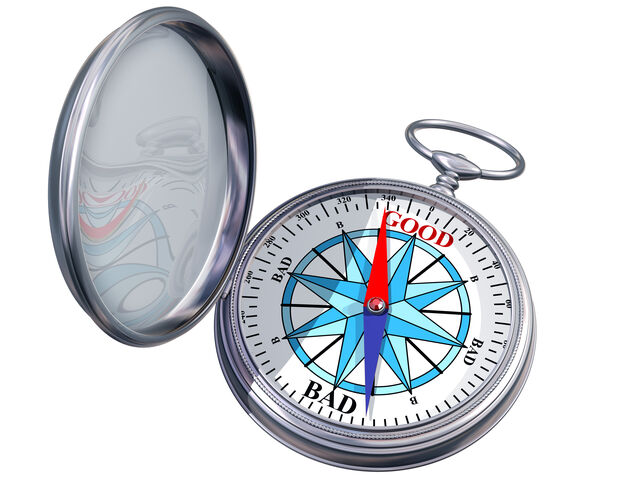Ethics and Morality
Where Does Morality Come From?
The natural origins of the human moral sense.
Posted November 25, 2020 Reviewed by Devon Frye

In the popular imagination, there is still quite a widespread assumption that religion is the source of morality. This is typically based on a belief that religion transmits the moral edicts of a divine creator of the universe. Despite the fully natural origins of morality having been very well established by scholars and widely accepted in the academic world, many people are surprisingly uninformed about this subject and are at a loss to even begin to explain the origins of morality in non-supernatural terms. This blog post will briefly sketch the outline of this vast topic in an attempt merely to orient readers to the scientific study of the human moral sense.1
Understanding the origins of morality, like all behavioral traits, requires an evolutionary perspective, taking into account both biological and cultural evolution.
I find it helpful to simplify this subject by considering first the individual characteristics and then the group dynamics that shape human morality. The individual characteristics include instinctual and emotional traits such as empathy and guilt, as well as higher cognitive capacities such as the ability to inhibit impulses and the capacity to reason. The group dynamics revolve around cooperation and competition, and the ways in which societal and cultural norms and rules evolve. All these individual and group factors are, of course, intertwined.
Instinctual and Emotional Traits
- Empathy
- Guilt and conscience
- Shame (and concern for reputation)
- Disgust
- Outrage and inequity aversion
All of these emotions and their behavioral correlates can be demonstrated in simpler form in other animals, particularly in other primates.
There is a large body of research demonstrating and delineating the complex moral instincts of young children, including babies far too young for these to have been socialized into them. Babies exhibit empathy, fairness, justice, and the ability to judge "goodness" and "badness" of human behavior.
Some of these emotions, such as disgust and outrage, can fuel either compassion or cruelty. Even empathy has the potential to fuel aggression, as when someone’s empathic identification with an in-group victim leads them to exact revenge on a perceived out-group perpetrator.2
Empathy3
Considering, as one example, the instinctual basis of empathy, primatologist Frans de Waal and others have provided compelling evidence of empathic behavior in our closest relatives, chimpanzees and bonobos, as well as in other animals.4 Certainly, chimps are also highly aggressive (much more so than bonobos, to whom we are equally related), mainly between groups and when hunting—for example, chimps catch and eat monkeys. But chimps also provide food for older or weaker members, without expectation of reciprocity. Chimps and other apes comfort fellow apes who are distressed.
What appears to motivate this kind of altruistic behavior is intense empathic distress—a literal case of “I feel your pain.” Neuroscientific experiments indicate that in humans, the same emotional brain circuits are activated when we ourselves feel pain and when we observe others feeling pain.5 Empathy is a very physical reaction and is closely related to unconscious mirroring behavior or imitation. It is frequently automatic and involuntary, such as when we wince or flinch when we see someone get injured. We smile automatically when smiled at—a hardwired developmental milestone at four to six weeks of age. Empathy also manifests as emotional synchrony, mood convergence, and contagion—such as occurs in crowds, audiences, large groups of spectators, and religious congregations.
Unbalanced, indiscriminate empathy would not have been adaptive for evolutionary survival. Natural selection in primates has produced both empathy and aggression, as well as cooperativeness and competitiveness.
Empathy is strongest when one identifies with the "other."6
Cognitive Capacities
Individual characteristics giving rise to the human moral sense also include higher cognitive capacities, particularly:
- Self-control
- Reasoning/rational intelligence
Self-control is a crucial faculty among complex animals. It allows an animal to suppress acting on an urge, or to delay gratification in order to achieve a greater goal—doing a more difficult thing for a larger but delayed reward. For example, self-control allows a predator to stalk its prey rather than pounce immediately. Self-control as a brake on aggression is crucial for cooperation in social animals.7
Humans excel at self-control, which can take very elaborate forms. Often referred to as willpower, it varies in strength between individuals, mostly determined by inborn temperament. Its relative strength or weakness in a given individual is remarkably stable across their lifespan, but it can be strengthened by the environment and learning/conditioning.
The role of reason or rationality in shaping the human moral sense is self-evident, and had generally been thought in the past by philosophers and psychologists to be the main factor shaping human morality before the central role of instinct and emotion was fully appreciated and understood. There is debate now about whether emotion or reason holds the greater sway over the human moral sense. While emotion is often more powerful than reason, reason is far more versatile and adaptable than emotion, and is capable of overriding emotion when deliberately and carefully deployed by the individual (aided by self-control).
Group and Sociocultural Factors
Socialization and education clearly play a major role in shaping our innate moral instincts into the differing forms particular morals take within different societies and cultures. An analogy has been made to human language, which is the product of a universal instinct determined in part by certain inborn grammatical rules, shaped into different final forms by a child’s learning within their particular culture.
Enlightened self-interest and reciprocity
Social factors shaping morality center on cooperation. Cooperation is strongly influenced by self-interest and reciprocity. Game theory applies mathematical models to study rational decision-making in situations of competition and cooperation, and is central to understanding fields such as economics, sociology, politics, and international relations.
The relative success of cooperative, trusting strategies versus uncooperative, self-interested strategies has been extensively tested in computerized "tournaments." It turns out that a "tit-for-tat" strategy of reciprocity wins most of the time: be nice and cooperate, but if the other player becomes uncooperative, be provocable to immediate retaliation. Then return to cooperation as soon as the other player does—be quick to forgive and to be "nice" again.
Reciprocity forms the basis of the "golden rule" that is a central tenet of most religions. It is a universally discoverable strategy for the fostering of cooperative societies.8
Expanding notions of "within-group"
In all primates, including humans, aggression is more commonly displayed between groups, with relatively more cooperativeness within groups. Humans have a greatly enhanced capacity for cooperation within groups due to language.9 With the advent of agriculture around ten thousand years ago, human groups grew larger as previously small hunter-gatherer groups transitioned to large settlements. Religion may have emerged around that time as a very effective means to bind expanding groups together. Groups further enlarged over time as cultural, economic, and technological advances led to increased specialization, trade, and interdependence.
In the last several centuries, the expansion of literacy was an important additional factor contributing to an expanding notion of "within-group" and the consequently expanding circle of empathy. People became much more able to put themselves in the shoes of those vastly different from themselves. The popularity of fiction in the form of the novel in the eighteenth century may have played no small part in this process.
Another very influential factor driving societal reductions of violence in the last several decades has been the increasing empowerment of women.
The social contract
Organized human societies all develop social contracts, either oral or written: rules or laws that reinforce and cement our basic cooperative instincts and maintain order. The theory of social contracts was developed in the seventeenth and eighteenth centuries by philosophers Thomas Hobbes, John Locke, and Jean-Jacques Rousseau. Hobbes envisaged the central authority of the state as being provided by an absolute monarch to restrain the power of individuals; Locke argued for rational, reasonable government with the consent of the governed. According to Locke, people are motivated by reason to surrender some measure of their individual authority to the centralized authority of the state, as a contract between rational groups, so that the state can protect the individuals’ rights to life, liberty, and property. The power to punish transgressors is ceded by individual citizens to the state.
Democracy, prosperity, education, secularism
Certain societal conditions clearly favor cooperation and compassion over aggression, including socio-economic-political stability, prosperity, democracy, a well-educated citizenry, and universally accessible high-quality health and social services. Additionally, the most peaceful, tolerant, compassionate societies in the world today tend to be very secular. However, secularism on its own cannot yield peaceful and compassionate societies; the other conditions are crucial, especially democracy. Over the last few centuries and decades, most Western societies, and a great many Eastern societies, have evolved from predominantly autocratic, authoritarian regimes to more or less democratic societies.
There is remarkable commonality and consistency in the laws of all effective democratic societies, despite cultural differences. The development of increasingly rational systems of law is achieved through sophisticated, informed debate in highly educated democratic societies.
Open information flow (greatly accelerated by the internet) is another crucial ingredient, making it much harder for totalitarian states to control the minds of their citizenry through propaganda.10
In Summary
Morality can be understood as a natural characteristic emerging from traits that are based on instinct and emotion and shaped by reason, evolving in an intensely social context. Humans certainly also have natural tendencies toward violence, cruelty, and selfishness, but prosocial, cooperative traits have held the overall advantage over antisocial, violent tendencies, in both biological and cultural evolutionary adaptation. Cooperation and compassion have taken an especially strong lead over violence and cruelty in modern educated secular democratic societies, when contrasted with most of human history. Reason and rigorous critical thinking are our best tools in this ongoing process of societal improvement.
Societal progress in our modern era has been uneven and faltering; catastrophic derailments have occurred along the way and will always be a risk. But the long-term positive trend toward more compassionate, cooperative societies has been strong and unmistakable. Societal ethics and compassion are achieved solely through human action—we have only ourselves and our fellow human beings to rely on in this collective human project.
References
1. Chapter 9 of my book Finding Purpose in a Godless World: Why We Care Even If The Universe Doesn’t (Amherst, NY: Prometheus Books, 2018) provides a more in-depth understanding and substantiation of the arguments that are merely summarized in this blog post. This post is adapted from that chapter. More substantial source materials are referenced in that chapter’s Notes section at the end of the book. The book is a deeper dive into questions of purpose, meaning and morality in a random, purposeless, godless universe.
2. More generally, human interpersonal violence is often carried out by people acting impulsively, insecurely, passionately, vengefully, or misguidedly. Only some is premeditated, calculated, or predatory. Much human violence is driven by ideology or intergroup conflict. Some premeditated violence is merely opportunistic—for personal gain, sometimes even trivial gain. Occasionally violence may be motivated by sheer callousness or even sadistic pleasure. However, as the social psychologist Roy Baumeister has showed, this last category is a lot less common than the cultural ‘myth of pure evil’ has led most people to believe [Roy F. Baumeister, Evil: Inside Human Violence and Cruelty (New York: W. H. Freeman, 1997)]. Most acts of apparent ‘evil’ are better accounted for by the aforementioned factors and motives.
Sadistic, predatory, psychopathic personalities lacking empathy or conscience are a small proportion of the population, but those individuals cause disproportionate pain and suffering for the rest of the population.
3. Empathy is the state of experiencing emotions that match another person’s emotions, or knowing at an emotional level what the other person is thinking or feeling without the other person having explicitly communicated this. Empathy may be thought of as a more fundamental, automatic reaction than sympathy, which is a more conscious feeling of compassion and concern for another. Sympathy is an attitude that one adopts toward another; it is often (but not always) strengthened when a feeling of empathy is also present. Many empathy researchers consider empathy to have two components: affective (emotional) and cognitive. Cognitive empathy is sometimes equated with social cognition or ‘theory of mind.’ Here we are focusing more on affective empathy.
[CLICK 'MORE' TO VIEW FOOTNOTES 4-10]
4. The evolution of empathy may have its origins partly in maternal-infant care. Females who were sensitive to their offspring and who reacted instantaneously to their distress, perhaps because this induced distress in themselves, would have out-reproduced those who were cold and distant, passing on this trait to their offspring. Mother-infant bonding is mediated by the hormone oxytocin, which has also been extensively studied in adult human and animal relationships, trust and empathy.
5. The motivation to relieve one’s own distress by relieving someone else’s pain has been shown to be even more powerful than obtaining a ‘selfish’ food reward at the expense of another. Experiments have revealed that animals—including apes and some other mammals—will actually starve themselves if their eating is directly linked to causing another’s pain. Watching another animal in pain is unpleasant and aversive to many higher animals.
6. Failure to identify with other people, seeing them as fundamentally different from oneself, will reduce or neutralize empathy. Racist nationalistic political regimes exploit this lack of identification with, and dehumanization of, other racial groups through xenophobic propaganda and indoctrination. An extreme example was the Nazi propaganda process of dehumanizing Jews by labeling them as subhuman vermin, pollution, a pathogen, or a malignant presence. Similar political strategies have been used prior to other orchestrated genocides, such as in Rwanda in 1994. As the Harvard psychologist Steven Pinker has noted, disgust by one group about another becomes a particularly potent force when combined with irrational beliefs such as utopian ideologies. Practically any means can come to be ‘rationally’ seen as a regrettable but justifiable action toward achieving an imagined utopian end. From this perspective, utopian ends are seen as infinitely good, and the extermination of a group of people who are believed to be preventing the achievement of a perfect, pure society appears to be justifiable [Steven Pinker, The Better Angels of Our Nature: Why Violence Has Declined (New York: Viking, 2011), pp. 320–43.]
The Nazi genocide of Jews and other ‘contaminating’ groups also illustrates how charismatic individuals with antisocial and narcissistic traits can hijack entire societies under certain conditions—especially societies that have suffered humiliating defeats and crushing loss of status and quality of life, such as Germany had after WWI and during the Depression. The co-opting of large numbers of people into actively perpetrating such atrocities—or simply looking the other way and compartmentalizing their moral sense—illustrates how societies can be seduced by irrational, even bizarre, uncritical belief systems and rigidly excessive forms of morality obsessed with utopian purity.
7. In complex social animals, self-control allows a group member to remain disciplined as the pack or troop hunts or defends itself in a coordinated, strategic effort. Discipline is reinforced by others in the group, often in accordance with a dominance hierarchy. Aggression between members within the group may occur, in competition for food, mates, and dominance, but ultimately, a strong level of group cooperation, cohesion, and discipline is required for the survival of the group. Therefore, self-control is a crucial brake on aggression, at least within the group—most aggression is directed at rival groups or other species.
8. Religion, rather than being the source of morality, has simply coevolved with human cultures over time, incorporating our natural moral sense (as well as our between-group enmity and our disgust-based obsessions with purity).
9. Language also powerfully magnifies the importance of reputation, as people's behavior is not only directly witnessed but is spoken about far and wide (including through gossip). Language also amplifies the power of reciprocity, for the same reasons.
10. We have witnessed in our lifetimes the massive effects of the internet on myriad aspects of society—just like the impact of the invention of the printing press in the fifteenth century. Clearly, the internet has strengthened human cooperation and expanded people’s general knowledge. It has of course unfortunately also bred and emboldened hatred and vitriol (often under the cover of anonymity, with the usual restraining effects of reciprocity and reputation stripped away). It has locked many ordinary people’s minds into echo chambers of filtered information and confirmation bias, and it has fed limitless nonsense to the gullible. But the net effect of the internet has undoubtedly been a vast expansion of cooperation, useful information flow and knowledge.




